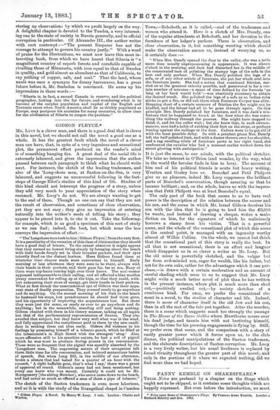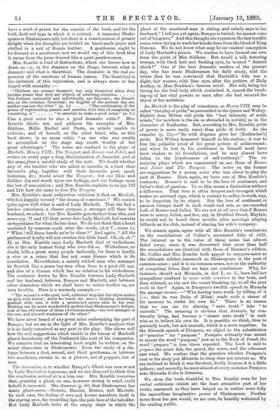FANNY KEMBLE ON SHAKESPEARE.* THESE Notes are prefaced by a
chapter on the Stage which ought not to be skipped, as it contains some thoughts which are happily expressed. But even before the introduction, we must Notes upon Some of Shakespeare's Ploys. By Frances Anne Kemble. London r. Richard Bentley sad Son. 1582.
have a word of praise for the outside of the book, and for the bold, dark-red type in which it is printed. A tenpenny Shake- speare is Shakespeare still, but there is a consciousness of greater delight when his thoughts are bedded on hand-made paper and clothed in a suit of Russia leather. A gentleman ought to be dressed as a gentleman, and we would say of this book that it issues from the press dressed like a quiet gentlewoman.
Mrs. Kemble is fond of distinctions, which she knows how to
draw, as, e.g., in the chapters on the Stage, between what is dramatic and what is theatrical. The dramatic is the real ex- pression of the emotions of human nature. The theatrical is the imitation of this expression, and is always more or less tinged with unreality :— " Children are always dramatic, but only theatrical when they
become aware that they are objects of admiring attention The Italians, nationally and individually, are dramatic; the French are, on the contrary, theatrical ; we English of the present day are neither one nor the other." (p. 4.) "The combination of the power of representing passion and emotion with that of imagining or conceiving it" "is essential to make a good actor." (p. 5.)
Can a good actor be also a good dramatic critic ? Mrs- Kemble thinks not, and adduces the examples of Mrs. Siddons, Mdlle. Rachel and Pasta, as artists :unable to criticise; and of herself, on the other hand, who, as this
book shows, is no mean critic, " as one who was unable to accomplish on the stage any result worthy of her
great advantages." The notes are confined to the plays of Macbeth, Henry VIII., The Tempest, and Romeo and Juliet, and evince on every page a deep discrimination of character, and at
the same time a careful study of the text. We doubt whether any of our readers who are asked to inscribe in a book their
favourite play, together with their favourite poet, sport, historian, &c., would select the Tempest ; but our likes and dislikes dep end much upon our feelings, and our feelings upon the law of association ; and Mrs. Kemble explains to us (pp. 123 and 124) how she came to love The Tempest.
Mrs. Kemble's most exhaustive criticism is that on Macbeth, which is happily termed " the drama of conscience." We cannot
quite agree with what is said of Lady Macbeth. That she had a harder conscience, a clearer purpose, a stronger will than her husband, we admit ; but Mrs. Kemble goes farther than this, and avers (pp. 71 and 72) that never does Lady Macbeth feel remorse or repentance for what shehas done. We do not think that a heart unvisited by remorse could utter the words, (Act V., scene i.), " What ! will these hands ne'er be clean ?" And again, " All the perfumes of Araby will not sweeten this little hand. Oh, oh, oh !" If, as Mrs. Kemble says, Lady Macbeth died of wickedness, she is the only human being who ever did so. Wickedness, no
doubt, kills a great many people indirectly, for there is hardly a vice or a crime that has not some disease which is its correlative. Nevertheless, a merely wicked man who manages to flourish like a green bay-tree often lives to a good old age,
and dies of a disease which has no relation to his wickedness. The contrasts drawn by Mrs. Kemble between Lady Macbeth and her husband, between Banqno and Macbeth, and between other characters which we shall have to notice further on, are very forcible. Here is a masterly example :-
" The woman's wide-eyed, bold, collected leap into the abyss makes us gulp with terror ; while we watch the man's blinking, shrinking, gradual slide into it with a protracted agony akin to his own. Nothing can be more wonderfully perfect than Shakespeare's delinea- tion of the evil nature of these two human souls,—the evil strength of the one, and the evil weakness of the other."
We have never heard of any great actor undertaking the part of Banquo, but we see in the light of Mrs. Kemble's analysis that it is as finely conceived as any part in the play. She shows well how the evil suggestions which rankle in the bosom of Macbeth glance harmlessly off the Nathaniel-like soul of his companion.
We conceive that an interesting book might be-written on the minor characters in Shakespeare. Even the study of a dia-
logue between a first, second, and third gentleman, or between
two murderers, reveals to us a picture, not of puppets, but of men.
The discussion as to whether Banquo's Ghost was seen or not by Lady Macbeth is ingenious, and we are disposed to think that the conclusion arrived at is a true one. Mrs. Kemble conceives
that, granting a ghost, no one, however strong in mind, could
behold it unmoved. She observes (p. 66) that Shakespeare has many ghost-seers,—Horatio, Hamlet, Brutus, and Macbeth.
In each case, the feeling of awe and horror manifests itself in the staring eyes, the trembling lips, the pale face of the beholder. But Lady Macbeth looks at the empty chair in which the ghost of the murdered man is sitting, and calmly says to her husband," I tell you yet again, Banquo is buried; he cannot come out of his grave." And this thought she repeats in the last terrible scene, when trying to wash her hands clean from the blood of King Duncan. We do not know what may be our readers' conception of Lady Macbeth's person. We confess to have formed our own. from the print of Mrs. Siddons. But would a tall, towering woman, with black hair and flashing eyes, be termed " dearest chuck ?" One of the best dramatic readers of the present day, who has made Shakespeare his daily study, told the writer that he was convinced that Macbeth's wife was a slight, fair woman, with blue eyes, after the pattern of Duly Audley, in Miss Braddon's famous novel. Her will, being too strong for the frail body which contained it, caused the break- ing-up of her vital powers so soon after she had secured the object of her ambition.
As Macbeth is the play of conscience, so Henry VIII may be called "the play of pride," as personified in the Queen and Wolsey. Rightly does Milton call pride the "last infirmity of noble minds," for nowhere is the sin so shrouded in nobility as in the character of Katharine. But, according to Mrs. Kemble, pride of power is more easily cured than pride of birth. As she remarks (p. 72),—" So with disgrace grew her [Katharine's] pride. But Wolsey honoured himself in his station ; it was to him the palpable proof of his great powers of achievement; and when he lost it, his confidence in himself must have been shaken to its foundations, and he may almost have fallen to the hopelessness of self-contempt." The re- maining plays which are commented on, are those of Romeo and Juliet and The Tempest. The notes on the former are suggestions to a young actor who was about to play the part of Romeo. Here, again, we have one of Mrs. Kemble's contrasts. Romeo's is said to be the love of sentiment, and Juliet's that of passion. To ns this seems a distinction without a difference. That love is often deepest and strongest which makes no outward sign, which is content to suffer, to work, nay, to be forgotten by its object. But the love of sentiment or passion betrays itself in such words and acts as are recorded both of Romeo and Juliet. We are not at all sure that if Romeo were to marry Juliet, and live, say, in Hertford Street, Mayfair, he would not be found three months after marriage playing billiards at his club, instead of sharing his wife's company.
We cannot, again, agree with all Mrs. Kemble's conclusions on the emendations of Collier's annotated folio of 1632. The interest as to the value of these notes has almost faded away, since it was discovered that more than half the emendations are identical with those of Hanmer's edition, Mr. Collier and Mrs. Kemble both appeal to common-sense as the ultimate arbiter, inasmuch as Shakespeare is the poet of common-sense ; and it is on common-sense, not on the authority of competing folios, that we base our conclusions. Why, for instance, should not Miranda, in Act I., sc. ii., have had her sympathies confined to some noble creature in the boat, and then widened, as she saw the vessel lireaking up, to all the poor souls in her ? Again, in Prospero's twelfth speech to Miranda the passage occurs :—" Who having unto truth by telling of it [i.e., that he was Duke of Milan] made such a sinner of his memory to credit his own lie." There is no reason that we can see for altering " unto truth " into " to untruth." The meaning is obvious that Antonio, by con- tinually lying, had become a " sinner unto truth" in such wise as to believe his own lie. It is possible, we think, thus to personify truth, but not untruth, which is a mere negation. In the fifteenth speech of Prospero, we object to the substitution of " practice " for " purpose." Prospero evidently was meant to repeat the word "purpose," just as in the Book of Jonah the word " prepare " is four times repeated. The Lord is said to prepare the great fish, the gourd, the worm, and the vehement east wind. We confess that the question whether Prospero's coat or his story put Miranda to sleep does not interest us. We are inclined to think it was the story, firstly because it is a little tedious ; and secondly, because almost at every sentence Prospero asks Miranda if she is listening.
We close the book, thankful to Mrs. Kemble even for her verbal criticisms (which are the least attractive part of her work), inasmuch as they have helped us to realise more folly the marvellous imaginative power of Shakespeare. Further notes from her pen would, we are sure, be heartily welcomed by the reading public.



































 Previous page
Previous page